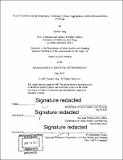| dc.contributor.advisor | David Hsu. | en_US |
| dc.contributor.author | Jung, Samuel (Samuel Seung) | en_US |
| dc.contributor.other | Massachusetts Institute of Technology. Department of Urban Studies and Planning. | en_US |
| dc.date.accessioned | 2017-09-15T15:32:12Z | |
| dc.date.available | 2017-09-15T15:32:12Z | |
| dc.date.copyright | 2017 | en_US |
| dc.date.issued | 2017 | en_US |
| dc.identifier.uri | http://hdl.handle.net/1721.1/111393 | |
| dc.description | Thesis: M.C.P., Massachusetts Institute of Technology, Department of Urban Studies and Planning, 2017. | en_US |
| dc.description | Cataloged from PDF version of thesis. | en_US |
| dc.description | Includes bibliographical references (pages 52-60). | en_US |
| dc.description.abstract | The ways in which electricity is being generated, distributed, transmitted, and stored are undergoing unprecedented change. Movements for energy democracy, and proponents of a Just Transition -a transformation of the current fossil fuel-based system into place-based, sustainable, equitable, and democratically controlled economies-have attempted to capture the potential of these changes to realize a low-carbon electricity system through new and more equitable electricity generation and procurement models. Community Choice Aggregation (CCA) is one such utility-scale electricity service provision model in California that explicitly aims to reduce greenhouse gas emissions through the provision of locally produced and democratically controlled renewable energy that simultaneously catalyzes localized economic development. Although community choice aggregation is a twenty-year-old electricity procurement and provision model, the growth of CCAs have been slow; they have only been legalized in seven states since its inception in 1997. To date, limited academic research has been conducted to examine the barriers to the growth of community choice aggregation Furthermore, this research does not connect CCA to larger strategies to enable such a Just Transition, nor does it identify policy levers to bolster community choice aggregators' ability to deliver on their stated goals. This thesis therefore examines the barriers to realizing community choice aggregation To do so, I conducted semi-structured interviews with individuals essential to the creation of six existing and two emerging community choice aggregators in California. I find that while exit fees, customer opt-outs, and financing remain persistent challenges to CCA formation, new CCA networks, and grassroots coalitions for a Just Transition have allowed CCAs to overcome these barriers. Additionally, I observed that for community choice aggregators, maintaining business functions and ensuring ratepayer-based revenue take precedence over catalyzing economic development. Ultimately, I find that while the CCA market has experienced significant development, allowing them to provide ratepayers cost competitive renewable energy, community choice aggregators have not matured to a point where they are able to meaningfully catalyze local economic development or deepen civic engagement in energy-related decisions at a local level. In order to transform those challenges into opportunities for deepening civic engagement and community wealth for (low-income) communities (of color) and further realize a vision of a just transition, this thesis concludes with proposed state regulatory changes to catalyze mutually beneficial "public-public" relationships between CCAs, electricity co-operatives, and unions to further advance a Just Transition, and help community choice aggregators deliver on their goals. | en_US |
| dc.description.statementofresponsibility | by Samuel Jung. | en_US |
| dc.format.extent | 64 pages | en_US |
| dc.language.iso | eng | en_US |
| dc.publisher | Massachusetts Institute of Technology | en_US |
| dc.rights | MIT theses are protected by copyright. They may be viewed, downloaded, or printed from this source but further reproduction or distribution in any format is prohibited without written permission. | en_US |
| dc.rights.uri | http://dspace.mit.edu/handle/1721.1/7582 | en_US |
| dc.subject | Urban Studies and Planning. | en_US |
| dc.title | A Just Transition : energy democracy, community choice aggregation, and the (im)possibilities of change | en_US |
| dc.title.alternative | Energy democracy, community choice aggregation, and the (im)possibilities of change | en_US |
| dc.type | Thesis | en_US |
| dc.description.degree | M.C.P. | en_US |
| dc.contributor.department | Massachusetts Institute of Technology. Department of Urban Studies and Planning | |
| dc.identifier.oclc | 1003291792 | en_US |
